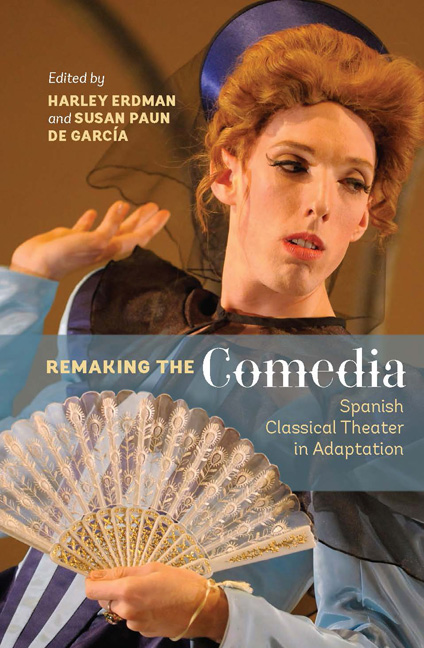Book contents
- Frontmatter
- Contents
- Illustrations
- Contributors
- Preface
- Note to the Reader
- Acknowledgements
- PART I THEORIZING
- PART II SURVEYING
- PART III SPOTLIGHTING
- 11 The Dog in the Manger: The Continuum of Transformation
- 12 El caballero de Olmedo: Los Barracos's Baroque Gentleman
- 13 Corpus Lorqui: Transformation and Transubstantiation in Los Barracos de Federico’s El caballero de Olmedo
- 14 The Phoenix of Madrid: Calderón's No hay burlas con el amor Reborn in Bath
- 15 A Prince in Pittsburgh: “Recasting” a Contemporary Staging of The Constant Prince
- 16 Directing Marta the Divine: Provocative Choices in the Service of the Story
- 17 The Dramaturgy of Absence: Minding the Gaps in Tirso de Molina, Ana Caro, and Feliciana Enríquez
- 18 Translations and Transgressions: Twenty-First-Century Questions Regarding Zayas
- 19 Comedia Actresses, Then and Now: The Case of Ana Caro's Valor, agravio y mujer
- 20 “Kinesthetic Empathy” and the Comedia refundición
- PART IV SHIFTING
- Play Titles Cited
- Works Cited
- Index
20 - “Kinesthetic Empathy” and the Comedia refundición
from PART III - SPOTLIGHTING
Published online by Cambridge University Press: 05 December 2015
- Frontmatter
- Contents
- Illustrations
- Contributors
- Preface
- Note to the Reader
- Acknowledgements
- PART I THEORIZING
- PART II SURVEYING
- PART III SPOTLIGHTING
- 11 The Dog in the Manger: The Continuum of Transformation
- 12 El caballero de Olmedo: Los Barracos's Baroque Gentleman
- 13 Corpus Lorqui: Transformation and Transubstantiation in Los Barracos de Federico’s El caballero de Olmedo
- 14 The Phoenix of Madrid: Calderón's No hay burlas con el amor Reborn in Bath
- 15 A Prince in Pittsburgh: “Recasting” a Contemporary Staging of The Constant Prince
- 16 Directing Marta the Divine: Provocative Choices in the Service of the Story
- 17 The Dramaturgy of Absence: Minding the Gaps in Tirso de Molina, Ana Caro, and Feliciana Enríquez
- 18 Translations and Transgressions: Twenty-First-Century Questions Regarding Zayas
- 19 Comedia Actresses, Then and Now: The Case of Ana Caro's Valor, agravio y mujer
- 20 “Kinesthetic Empathy” and the Comedia refundición
- PART IV SHIFTING
- Play Titles Cited
- Works Cited
- Index
Summary
However, a public that shudders at train wrecks, that is
familiar with earthquakes, plagues, revolutions, wars;
that is sensitive to the disordered anguish of love, can
be affected by all these grand notions and asks only
to become aware of them, but on condition that it is
addressed in its own language, and that its knowledge
of these things does not come to it through adulterated
trappings and speech that belong to extinct eras which
will never live again.
–Antonin Artaud, The Theater and its DoubleThe 2011 refundición of Porgy and Bess caused a major stir when heirs to the estates of George and Ira Gershwin and DuBose Heyward (lyrics) requested a Broadway-style adaptation of the trio's original four-hour opera. The production team hired by the estates (comprising diane paulus, director; Suzan-lori parks, playwright; and Diedre L. Murray, composer) began to cut. Recitative became dialogue, major arias were eliminated, and the title was changed to The Gershwins' Porgy and Bess. Soprano Audra Mcdonald, Bess in the production, defended the changes, stating “I imagine Gershwin purists will have their arrows in their bows, ready to shoot” (Healy). And she was right. In an open letter to the New York Times, composer Stephen Sondheim openly criticized the “wholesale rewriting” of the work, and expressed concern for the “legacy” of the original. “In the interest of truth in advertising,” he wrote, “let it not be called The Gershwins' Porgy and Bess, nor even The Gershwin–Heyward Porgy and Bess. Advertise it honestly as Diane Paulus's Porgy and Bess. And to the hell with the real one” (Sondheim).
The comments by Mcdonald and Sondheim highlight opposing approaches to contemporary stagings of previously performed works. While Sondheim argues for the singularity of a given work that is “the real one,” Mcdonald advocates for its adaptability: “The opera will always exist to be performed. What we wanted to do was a new conception that tries to deal with the holes and issues in the story that would be very, very obvious to a musical-theater audience” (Healy).
- Type
- Chapter
- Information
- Remaking the ComediaSpanish Classical Theater in Adaptation, pp. 197 - 208Publisher: Boydell & BrewerPrint publication year: 2015

